Bullying and being bullied: Why it happens and what families can do
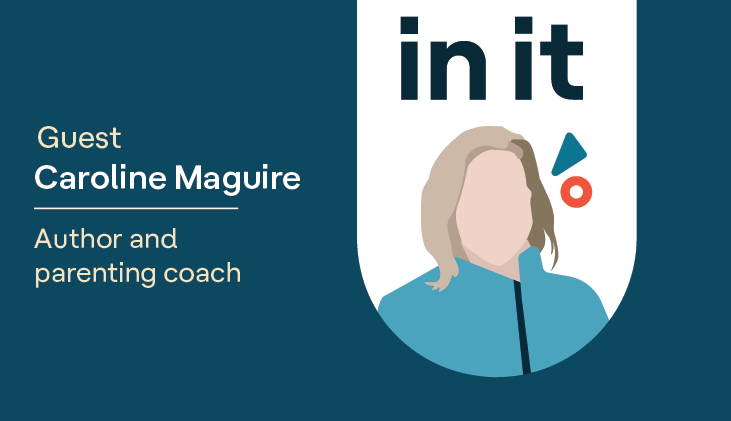
Stay in the know
All our latest podcasts delivered right to your inbox.
Why do some kids bully others? And why do some kids seem to be targets of bullying behavior, time and time again?
In this episode, hosts Gretchen Vierstra and Rachel Bozek talk with parenting coach Caroline Maguire, author of Why Will No One Play With Me? The Play Better Plan to Help Children of All Ages Make Friends and Thrive. She specializes in social-emotional learning and raising kids with ADHD.
Tune in to learn about both sides of bullying, and what families can do to help. Plus, hear Caroline share her own story of being bullied, and how that experience shapes her work.
Related resources
Plus, check out Caroline’s book, Why Will No One Play With Me?
Episode transcript
Gretchen: From the Understood Podcast Network, this is "In It," a podcast about the ins and outs...
Rachel: ...the ups and downs…
Gretchen: ...of supporting kids who learn and think differently. I'm Gretchen Vierstra, a former classroom teacher and an editor here at Understood.
Rachel: And I'm Rachel Bozek, a writer and editor with a family that's definitely in it. Today we're talking about bullying and we're talking about it with someone who was bullied herself as a kid with learning and thinking differences. And she sees the impact it can have not only on kids who are bullied, but on the ones doing the bullying.
Gretchen: Caroline Maguire has a master's in education and is a parenting coach specializing in social emotional learning and on raising kids with ADHD.
Rachel: She's also the author of "Why Will No One Play With Me? The Play Better Plan to Help Children of All Ages Make Friends and Thrive," which has won multiple awards.
Gretchen: And she writes regularly for a bunch of publications from U.S. News and World Report to Today Parenting.
Rachel: We're so glad she's joining us today.
Gretchen: So Caroline, welcome to "In It."
Caroline Maguire: Thank you so much for having me.
Gretchen: We're really happy to have you here today. And as you know, we're going to be talking about bullying, both in terms of kids being bullied and kids exhibiting bullying behavior. But before we do, I wonder if you could just define what bullying is and what it isn't, because not all like mean or bad social behavior meets the definition of bullying, right?
Caroline Maguire: Yeah. And I think that's really important because I think intention is a big piece. And so, I looked up a bunch of things — used my own personal experience having been bullied pretty badly — and I really think it's an intentional thing where people intimidate, harm, coerce someone, and it's usually someone they feel is vulnerable, but not always. It's, to me, the intention to harm is really key.
Gretchen: And with bullying too, isn't it a matter of that it's kind of repeated behavior?
Caroline Maguire: Yeah, I think it is. Although people do quickly name something bullying. And that is, to me, part of the distinction, is it repeated behavior? Is it intended to harm? Is it intended to coerce? It is not that bullying can't be a one time behavior, but there are times where kids do something and it's just thoughtless behavior. And I think when people really are bullying, you know, I was thinking of some of my clients and some of the people that I know and people who write me from all over the world since "Why Will No One Play With Me?" came out. And a lot of times people tease someone, but if you tease with the intent to harm, if you know they don't understand or if you know they don't read social cues and have, for instance, autism and you keep going, that's intent to harm.
Gretchen: The intention is really key then?
Caroline Maguire: I think so.
Rachel: Yeah. And I feel like when you mentioned coercion, even, you know, the idea of there being a threat, you know, like the sort of if you don't, whatever, then this will happen.
Caroline Maguire: Yeah. And I think that that is at the heart of all bullying, to be honest with you, having experienced bullying and putting myself in those shoes again, you know, you try to walk different hallways, you try not to be in the line of sight of the bully. You try to orchestrate yourself so that you're safe. And part of that can be coercion, where they are making sure you know that if you do X, Y, and Z, you know, if you even appear on social media, if you post something, I'm going to come after you.
Rachel: Yeah. Well, thank you for all of that. And I was wondering if you would mind sharing with us a little bit of your own experience as a child who was bullied. And I know that that informs so much of what you do now as a parenting coach.
Caroline Maguire: Thank you. Yeah. So, I was like an old soul and I was probably a pretty quirky little kid. And I spent most of my time with adults. I was, you know, an only child and I have a bunch of learning disabilities. And that sometimes makes you a target because when you go up to do math at the board or you stutter in your reading, people often pick on you. And I had a very small school, and I was in class with only two girls, and they were my bullies. And, you know, the reason that I do the work, I do the reason that I want kids to have friends is because I didn't have any friends. I was paddling around with the boys in my class, but I didn't really have any girlfriends and they tortured me. I mean — this is in the book — they locked me in a bathroom in a basement and left me there. I was physically assaulted many, many times, and it got better as I got older and got away from those particular people. But I did have some bullying in sixth and seventh grade as well. And some of it was that I was the kind of kid it was, you know, reading Shakespeare and talking about it. Like I, you know, I'm not saying I wasn't quirky.
Rachel: That's awesome.
Caroline Maguire: But, it became more in seventh grade that coercive bullying where someone is, you know, really using a lot of mind tricks and tactics. And so, I always know what it feels like to be trapped. And that's really what it is. You know, it's feeling trapped. It's feeling you have no power. It's feeling that, you know, you hope every day to avoid that person and that you're hoping you can orchestrate things so that you're protected and you also kind of feel like you're, you know, like, "Oh, am I right that this was intentional a lot of the times?" So, you doubt yourself and it really kills your confidence if you had any confidence. You know, it's really assaultive to the confidence and, you know, all of that happened. Things got better for me. I ended up making friends because I really learned to change the way I approached things socially. I learned better social skills, but it's always been with me. And when I started working with kids, I saw this deep need to help kids become more empowered and have the social skills they need and make friends and move forward from where they've been and feel like "I'm great. And let me show you how great I am," and feel that confidence.
Rachel: Wow. Thank you so much for sharing that really personal stuff. And you know, you can tell that it sticks with you. I mean, that was so many years ago. And we know that a lot of kids experience this. So we just really appreciate you kind of going there.
Caroline Maguire: You know, it really is something I just want to impress the parents. Even if kids get away from their bully, you may find that they do lack confidence in certain situations, that they do not want to assert themselves in certain situations. I will tell you, I am, you know, in my forties, I still have to check in with myself. If something happens and say, "This isn't about you. They're not leaving you out on purpose." And I still really feel that trauma in certain circumstances. And so, if you feel this for your child and you're like, "Oh, things are better, but I see these legacies," I really encourage you to help that child get therapy because it really does make you feel things and it stays with you.
Gretchen: As you know, this podcast is for families with kids who learn and think differently. So, can you talk a little bit about why, in your experience, those differences might make a child an easy target for bullying?
Caroline Maguire: I think learning and thinking differences play into bullying because there's a lack of understanding from peers that sometimes kids are unable to do things and to understand that people are struggling and therefore those struggles sometimes make us the target. I think the environment has a profound impact — the leadership, the coaches, the educators — in terms of how they ignore or foster a culture of acceptance, a culture of empathy. And, you know, all the research bears this out, that if we do peer sensitivity training and if we at the top and as adults foster that, it is much less likely that kids with learning differences will be targeted. And I think that's important as parents are looking for solutions to know, like, there are solutions. And part of it is that peer sensitivity training.
Gretchen: Yeah. Yeah. And then what about the flip side? Is there ever a case where you've seen that learning differences and being a bully might come hand in hand sometimes?
Caroline Maguire: Absolutely. So, you know, I work with kids who are labeled as the bully. I have incidents even this week where kids did poor self-regulation stuff. You know, not the smartest move stuff, stuff based on their own learning profile. And those mistakes were very quickly labeled as bullying. And I think, you know, we have to remember the bully, the bystander, and the victim, they all need help.
Gretchen: Right.
Caroline Maguire: You know, and so sometimes kids become bullies because they make silly mistakes. Sometimes their executive function and management system of the brain, their self-regulation is very weak. Sometimes they turn to bullying because of their own emotional state, their own feelings of insecurity. And that can stem from our learning differences, from the fact that we're frustrated to be the only one who can't read, where we're left behind, we're embarrassed, we're mocked, and therefore we turn to something that is not necessarily what we should do, but it stems from these emotional needs. Bullies, I'm not saying this like, if you're listening and your kid is being bullied, you're like, "Oh my God, she took their side," but it's important to know that bullies have emotional issues. That's why they do this.
Rachel: Yeah. And we wanted to share with you a voice memo that we got from a parent whose child has been in both of these roles and kind of on both sides of this bullying coin, having been kind of the recipient of bullying behavior and also been the one delivering it, right? So, it would be great if we could listen to it and then maybe we can talk about it, if that sounds OK.
Caroline Maguire: Absolutely.
Rachel: All right. Let's listen.
Mom - voice memo: One of my daughters is diagnosed with a learning disorder, specifically in math. She's also had learning difficulties receiving several special education services, as well as speech and language therapy. On a regular basis, her challenges include just processing language and how she understands what people say and how they say it. So, when she was in elementary school, she was very heavily bullied. She was very thin — she's always been very thin — so she got bullied for that. Also, because sometimes she doesn't understand what's being said to her, she gets made fun of or called stupid. She's always, always wanted to have friends, and she valued friendships, but she struggled to have friends in elementary school. Moving on to middle school, she then had the opportunity to make friends, which she was very excited about, and I think that just wanting friends led to her, just accepting any friends, and the friend group she was in was very toxic. And then I found out, I think it was last summer that she had become the bully. So, there was a message exchange between her and one of the girls in that group that the mother had sent to me, and it got to the point where my daughter was saying very mean things to the girl. They were going back and forth, but I was very surprised at how mean my daughter was being. So, constantly being considered dumb, she then turns around and tries to compensate for that by treating others like they're less than her. In certain situations, not all the time, but in order to feel like she can have some control over the situation. You know, it's hard as a parent to know that that is your child and that your child is capable of that because you try to raise them to be kind and diplomatic and all these things. But at the end of the day, they have their own personalities and experience influence who they become. So, it's definitely a grueling process and parenting is super difficult. And it's interesting how different each kid can be, but I'm hoping for the best for her.
Rachel: Well, first off, I just want to thank that mom for sharing her experience with us. We really appreciate it. And Caroline, we know it can be incredibly distressing for a parent or caregiver to learn that their child has been bullied. But as we can hear in this mom's voice, it can also be really distressing for the parent who finds out that their own child is doing the bullying. How should we react if we get that call from school or camp or wherever saying that our kid is doing the bullying? Because I'm guessing our first reaction yelling or freaking out or maybe grounding our kid for six months is not the best reaction, right?
Caroline Maguire: So, I want to say that I totally understand. And if you do freak out, it's always OK to say, "Hey, I reacted and I was upset and I know I said some things, but now we need to move forward," right? So, if a parent is listening and they're saying, "Last night I did exactly this," you know, the best thing to do is first to gather information. So, in many cases that I've been involved with, kids have done things and have either turned to bullying, you know, like in this this voicemail, or they have done something. And there's often a lot of nuanced information that we need. And part of that information helps us help your child, right? I also would say that if your child is being accused of bullying and they are on any kind of independent education plan and self-regulation and other factors are part of that, that the school has certain things that they need to do, because in many cases, this is to us a wake up call. That the child who is being accused of bullying does not have the skills and is having an emotional reaction and doing things that, no, are not a good choice. We're not happy about this, but before we just punish, there's a real opportunity to intervene with new skills to get them emotional help and therapy and to also get the full story. And I say this because just this week I had a person do something where they knocked, they knocked into something, they knocked it over. They were being too goofy and silly and were immediately accused of, "Oh, this must be intentional." And it wasn't intentional, right? It was poor self-regulation. I've had kids who, you know, throw someone's hat out a bus window that's open. They never meant to do that. Should they have been horsing around so much? No. But it wasn't the intention to hurt someone. So, I just, I think we have to get all the information, which may mean, you know, having a good cry, taking a deep breath, and then I think we need to help this child. Punishing is not going to help them make better choices, right? They may need to apologize. They may need to take ownership. You know, they may infuriatingly not understand what they've done, right? But kids, especially kids with poor self-regulation, make poor choices. I've had kids posting also on social media that got other people in big trouble. And the parents were like, why would you post that? Well, because they didn't think they didn't pause, right?
Rachel: Right.
Caroline Maguire: They didn't realize the consequences of their actions. If you post someone with a BB gun on social media, the police might think it's a real gun, right? Like, there's all these factors that come in. So, I think like with this voice message, there was so much information here about this child's past, about her struggles, and about the fact that this is a real opportunity to give her the help she needs.
Rachel: Yeah. Yeah. Yeah. Thank you for all of that. And you know, one thing I've heard just from teachers and hearing about stories like these, on the information piece, that it's, there's always another piece of information. Like, there's always like, "Well, what happened right before that?".
Caroline Maguire: Right.
Rachel: "And what was the last thing that happened before that?" And none of it is saying that the response was OK at all, but it has helped so much in situations I've seen and some that I've gotten the call on where it's like, "Well, what were that 30 minutes or so leading up to this like for you and for the other kid or kids who were involved in whatever the situation was?" And that is usually so telling.
Caroline Maguire: It is usually so telling. And I think too, you know, look, I've had kids who were horribly bullied that I've worked with. They call, the parents call the other parent, and the other parent says something horrible, like "If your kid wasn't weird, they wouldn't be bullied," right? So, I'm not saying like, if parents are listening and they're saying, "I called, you know, the bully's parents, I tried to act with empathy, I try..." I get it, right? It doesn't always get the response. But many, many of the parents that I know work with people who write me their kid is has done something. And I think that this mother's story is very telling in the sense that she's not trying to foster a bully. She's horrified, but she's also now dealing with a situation where a kid who was bullied herself felt she had no options; has, you know, learning disabilities, struggling herself, has now made choices. There's a lot of people pleasing in this story because the child felt she had no options. And I want to say that to parents that, you know, everybody wants friends. So, if we find our child feels they have no options, that's why I do what I do, to try to help kids learn those social skills so that they can find a different group of friends. And just telling them you have options doesn't really create those options. We may need to remove them from the situation. We may need to empower them with skills. We may need to figure out how we can make them safer. Because just saying to them, "Don't let people treat you that way, pick different friends," doesn't allow them the opportunity they have to go back to school tomorrow and they have to sit with someone. They have to partner with someone in the projects. So when do projects nowadays, projects make lonely kids aware of their loneliness more?
Rachel: Yes. And it's so stressful if it's like "Find a partner," and you're like, "Oh, I'm the kid without the partner,".
Caroline Maguire: Right.
Rachel: That's even stressful like for grown ups when and they're like, "Find a partner," and I'm like, "No, can you just tell us who to work with?"
Caroline Maguire: Yeah. And that's what maybe we all have to remember, too. We can learn as adults to not set up these scenarios.
Gretchen: Yeah. So, you know, still going to the story of, like, kids who were bullied or and then become the bully or just kids who are bullying themselves, whether they meant to be in that position or not. Is repair a meaningful part of this process? So, it's part of the process getting the bully and the kid who's being bullied to work it out, or is that not a good idea?
Caroline Maguire: I think it really depends. And I don't mean to be annoyingly vague, but I think that the repair can be part of the process. I did have repair, by the way, from one of my bullies, and I guess it was good, you know. But I think in some cases, if the bullying wasn't intentional, right? They threw the hat out of the bus window, they knocked something over, they accidentally hit someone because they were being too much or they were goofing around. If that's possible, then I think repair is absolutely important, right? I think in some situations we as adults don't know what to do. And so, we put these kids together and we say "Work it out." And in some cases, the kids don't have the skills. I mean, I firmly believe that the reason some kids do certain things, the ghosting, the breaking up with people, is that they don't have the emotional skills to have those conversations. They don't have the emotional skills, like in the story that we heard to say, "I don't love the way you're handling this." And they post stuff on social media, with intention or not, and they don't handle it well. So, to just stick them in a room and say, "Work it out," I want the adults to facilitate and I want to make sure we're not putting someone in an unsafe situation. Because I've seen this, by the way, where we put the two kids in a room and the victim comes back to me and says, "Yeah, you know what they did? They whispered to me, 'Your life is going to get really awful now'," right? So, we have to remember, like, these circumstances really matter. And some kids are just mean, right? And they're not going to do that repair.
Gretchen: Yeah.
Rachel: You know, another thing I think that makes all of this so challenging is the shame around bullying and these situations and whether, you know, for the child who is doing the bullying, the child who is being bullied or the parents of either child. So, do you see that? And if you do, how do you tackle that?
Caroline Maguire: I do see the shame. You know, developmentally, teenagers are supposed to have friends. This stage is to assert themselves, have their peer group. And there's a lot of shame involved in being a person who doesn't have friends. And there's a lot of shame involved in having been bullied. There's also this misnomer that we as human beings always have where we believe we're the only one, right? And so, there's so much shame for the person being bullied because they feel othered. They feel "If I wasn't unworthy, that no one would do this to me," right? There's a lot of self-esteem issues at the heart of this, a lot of confidence issues. Parents often ask me, when someone is bullying their kid, why can't their kid respond differently? You know, why are they letting this happen to them? And I'm like, "The responses you're wanting require a lot of, they're an adult perspective and they require a lot of confidence," you know, to turn to someone and say, "Keep talking and I'm not listening to you," or something. I read these things in articles and stuff and I'm like, "Oh my God, this is not something I would ever have said," you know?
Rachel: Right.
Caroline Maguire: And then there's shame on the part of the parent and the person if they do bully, if they do turn to this and they've, you know, maybe even been a victim and then turn to bullying. There's a lot of shame there, too.
Gretchen: Yeah. I think you're so right, though, about we adults sometimes our ideas of how kids should respond, we're forgetting what it's like to be a vulnerable kid who doesn't have the self-confidence to say, "I'm just going to walk away from you and not listen to you right now," you know. That's hard!
Rachel: Right. I can't even get my kids to do that with each other. Yeah, just walk away.
Gretchen: Exactly.
Caroline Maguire: Right. And I think we have to remember, there are kids who do that, you know?
Gretchen: There are, yeah.
Caroline Maguire: The bully, if the bully really intends to harm, right? Then they are seeking the people who they can harm. Or they are testing people out. And so, they may have said that to someone and a kid was like, you know, "Keep talking," or walked away or did whatever. But it's usually a situation where that kid has self-confidence.
Gretchen: Yeah.
Caroline Maguire: And they also may have a circle of friends protecting them. They may feel that they are you know, they may be, you know, have something else that allows them to feel that empowered.
Gretchen: Right.
Rachel: Right. Like that safety in numbers feeling.
Caroline Maguire: Right.
Gretchen: Well, speaking of another challenge of young people, social media. This can make this whole situation so much more challenging and things can escalate so quickly. And then you've got this permanent record out there, right? For anyone to see this footprint on the media there, How do you help kids navigate this minefield?
Caroline Maguire: So, I really believe that we need to start having not just discussions with our kids about social media, but we need to start holding classes and things to teach them at a younger age when they're more receptive, not, you know, 11th grade or something where they're going to just mock it about pausing and about digital literacy and about the consequences. I see so often situations where, you know, kids are taking photos of each other in a locker room, incredibly inappropriate, but they probably just don't realize, right? And it's that lack of knowledge. It's dangerous at this point, though. I think we need to talk about things with our kids and I think we need to not pounce. We have to have that bond and that relationship with our kid. And if you don't, then it can be repaired. It can be built. And we need to talk about things in terms of them understanding this footprint and that it's out there and learning to also not put everything out there.
Gretchen: Yeah, I mean, I feel like some of it too, with social media is how at least I've seen this in my own house, is how kids read each other's messages, what they might read intention into something, or they might just misunderstand something because it's all just words in a text, sometimes in all caps, because that seems to be the trend with young people. Even though I'm like, "Doesn't that mean you're shouting?" But they're like, "No, that's not what it means. It means excitement." But I feel like sometimes that could be a challenge too, right?
Caroline Maguire: Yeah. And also, like, if your kid doesn't read between the lines, that's also a challenge, right? So, a lot of our kids with learning disabilities don't read between the lines and so they don't understand the message. Reading it aloud is actually a great way to help them understand the intention behind the message or the sarcasm behind the message. And I think there's often a lot more vulnerability for our kids in terms of what they're putting out there versus their actual cognitive ability to handle the decisions they're making. And I think, again, I don't think they have the skills.
Gretchen: Yeah.
Rachel: Exactly.
Gretchen: So, switching gears, what should a parent do if they think their child is caught up in a bullying situation but the child isn't talking about it? How do you bring that up in a way that might get them to share with you rather than shutting them down?
Caroline Maguire: Well, the first thing I want to say is we have to, as parents, not pounce, right? It should be very short little conversations. It should not be us invading their space when they're trying to do something or they're doing their homework or they've you know, they've told us, "I can't talk today. I've had a very long day. I have to get this done," or something. And often what happens to us as parents is while they're at school, our anxiety is building. And so, by the time they come home, they walk through the door and we're like, "Mrs. so-and-so told me that you're being bullied....," and the kid is like, "Whoa."
Rachel: Yeah.
Gretchen: Oh gosh, that feels so real right there. That we pounce. It's so bad.
Caroline Maguire: It's so, I mean, it's so what we do, right? We as parents do this and we are all guilty of it. And by the way, if you've done this, it's not over, right? I make videos about this all the time on Instagram, I'm like "It's not over." But I think we have to remember how that feels. Like, how would you feel if there was something super vulnerable, super shameful that you, was happening with you and you walked in the door and your partner was like. "Blah, blah, blah, blah...," you'd be like "Whoa!"
Rachel: Yeah.
Caroline Maguire: I think we have to make sure we're building that relationship where we don't just talk about this one topic either. Have fun with your kid, allow them to say, "I can't talk about this anymore." Um, the first, first thing I want you to do is express empathy, you know? And the other thing to remember, especially with teenagers, is I call this kitchen counter conversation. Often teenagers don't really respond to you, and you're like, I got nothing. And then a few days later, you're at the kitchen counter and they come and they start talking. And that might be the time that you're like, "We do not need to have this conversation right now. It is 10:00 at night," but that's when they're going to talk to you. A great way to get kids to open up — and I'm not really a fan of video games — if your kid likes to do video games, sit next to them and talk to them while you do video games. Some kids prefer the car because they don't have to look at you in the eye. But don't pounce, right? So, kids have told me like "I don't go out to dinner with my mom because if I go out to dinner with my mom, that's where she, like, pounces on me," right? Just go out to dinner. Don't make it...
Rachel: I'm not worth a free meal?
Caroline Maguire: Right? Exactly. But I think the key too is to open up either by saying, like, "I heard something," or also just saying a story that you have, right? A story where you weren't treated very well, not inappropriate, but just like, "Hey, there, you know what? I remember there was a friend of mine and, you know, she wasn't very nice to me." And then also kids don't believe that they're special and wonderful as we believe they are oftentimes. So, let's make sure that this kid has a place to shine at least once a week, something they're good at and someplace they have to build confidence. Because this is so hard on one's confidence.
Gretchen: Giving kids a place to shine. I like that.
Rachel: Totally. And I feel like when you have those, like kind of side by side conversations where they don't have to look you in the eye, they're listening more than we think, because, like, I've had a couple of those where I'm like, " Well this sort of happened to me once." And I'm just like, "Yeah, nobody heard that." And then, like, a month later, it'll come up in some completely unexpected context. And it's like, "Oh, is that kind of like that time you were telling me about?" And I'm like "What? You heard me?"
Gretchen: Yes.
Rachel: So, yeah.
Gretchen: Yeah. And I think it's important for them to know that we're not going to pounce. We're not going to overreact, that they can tell us something. And, you know, one of the big things about resilience research, that it shows, I think feels true to me, is that kids feel empowered and resilient when they know one single adult in their life has their back and will help them solve a problem and then eventually that they know they can solve the problem. To be that adult, we have to self-regulate. And I'm not saying it's easy, it's hard. And if you mess up tomorrow, you do better, you know? But we have to not become so worked up so that we can have our thinking brain, right? Because it's really, it's really, really hard. It's your child and you're hearing that they're being mistreated, you know?
Rachel: Yeah.
Gretchen: Oh, my goodness. You've given us so many good tips and advice, Caroline. So, as we get close to the end of this conversation, is there anything else you want to add? Any advice for parents whose child is caught up in a bullying dynamic? Anything we might have missed?
Caroline Maguire: I want to give people hope, right? And I have a fabulous life. I have wonderful family. I have really good friends now. It didn't take me till my forties to have that happen. This can shift and I don't want anyone to feel that this is like a forever thing. I think many, many times you are their original teacher and you can be there for them. And what we really need to do for everybody is get them the skills that they need and then make sure they have that feeling that they can shine and that special feeling of confidence which comes from them knowing their strengths. For me it was drama. Every day at 3:30, my day may not have been good. I knew that I had that. And it really does make a difference because you're in a tough situation. And I also want to say to parents, we all make mistakes. We all pounce. Like people may be like, "Oh my God, she said, pounce, I do that like every day," but tomorrow…
Rachel: I do it people. And I know I need to stop.
Caroline Maguire: And tomorrow you get up and you try to do different, right? And and so I really want to give people hope like this can get better. And just the fact that you're seeking answers, that's huge.
Gretchen: Mm hmm. Yeah. Yeah. Oh, it's a tough topic, but such an important one. Caroline, thank you so much for being with us today.
Rachel: Yes, thank you so much. This was really helpful. And thank you for sharing so much about yourself, too.
Caroline Maguire: Oh, no problem. Thank you so much for having me. And I'm so glad to share anything because it really helps somebody to know that somebody else has been there and things worked out.
Gretchen: Caroline's book is called "Why Will No One Play With Me?" You can find out more about her work at carolinemaguireauthor.com.
Gretchen: You've been listening to "In It" from the Understood Podcast Network.
Rachel: This show is for you. So we want to make sure you're getting what you need. Email us at init@understood.org to share your thoughts. We love hearing from you.
Gretchen: If you want to learn more about the topics we've covered today, check out our show notes. We include more resources as well as links to anything we mentioned in the episode.
Rachel: Understood.org is a resource dedicated to helping people who learn and think differently discover their potential and thrive. Learn more at understood.org/mission.
Gretchen: "In It" is produced by Julie Subrin. Ilana Millner is our production director. Justin D. Wright mixes the show. Mike Ericco wrote our theme music.
Rachel: For the Understood Podcast Network, Laura Key is our editorial director, Scott Cocchiere is our creative director, and Seth Melnick is our executive producer. Thanks for listening.
Gretchen: And thanks for always being "in it" with us.
Hosts

Gretchen Vierstra, MA
is the managing editor at Understood and co-host of the “In It” podcast. She’s a former educator with experience teaching and designing programs in schools, organizations, and online learning spaces.
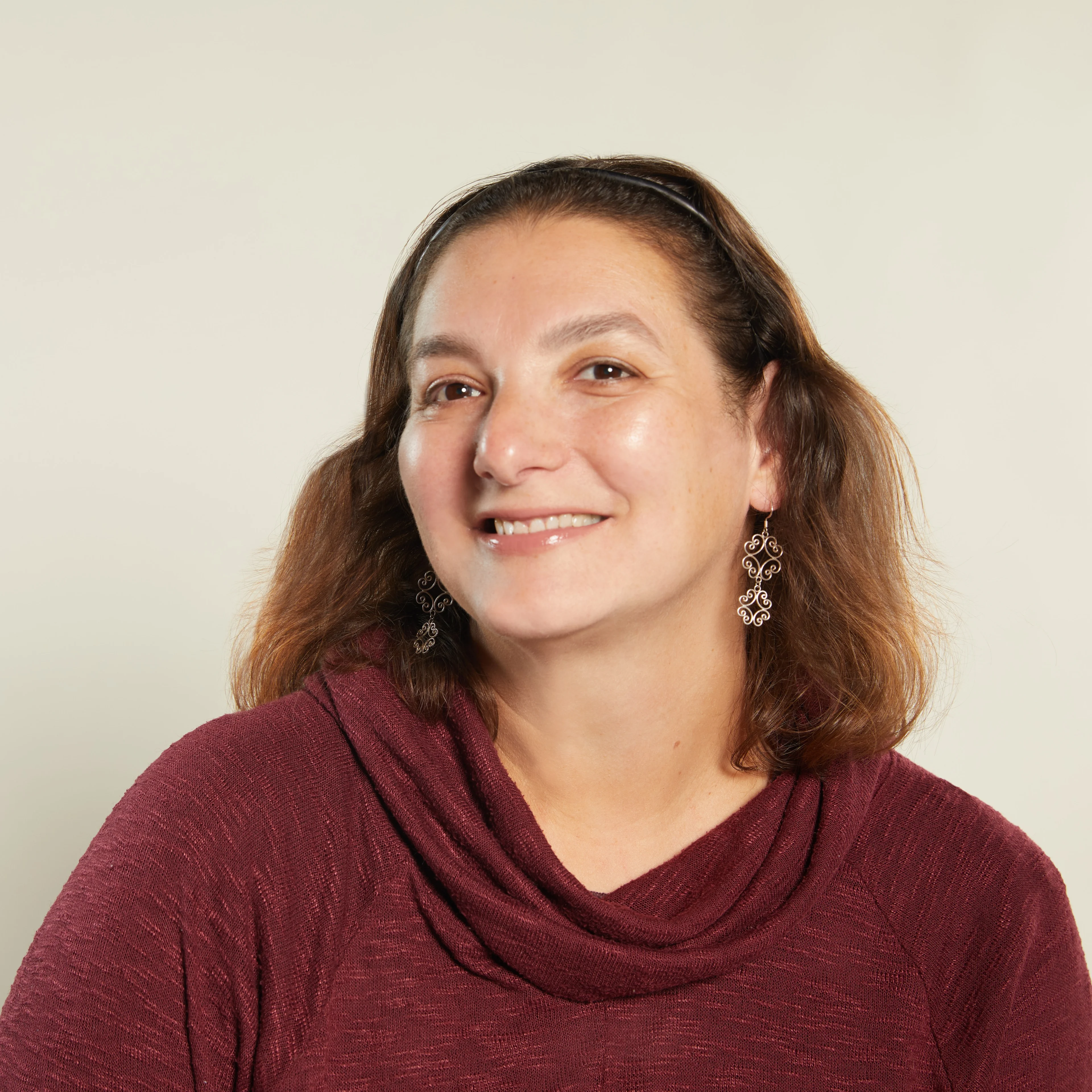
Rachel Bozek
is co-host of the “In It” podcast and the parent of two kids with ADHD. She has a background in writing and editing content for kids and parents.
Latest episodes
April 25, 2024
Learn about common reasons families might look for a special education attorney and what their other options are.
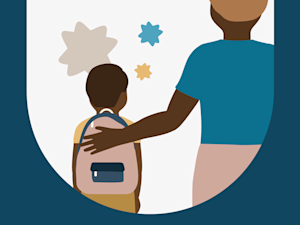
April 11, 2024
Learn ways to advocate for your child at school while maintaining a good relationship with their teachers.

March 28, 2024
The track and field gold medalist shares her story and talks about ADHD, dyslexia, and building confidence.

March 14, 2024
The hosts interview kids’ book author Lindsey Rowe Parker. She talks about her new picture book about sensory differences in kids.

February 29, 2024
Understanding what a language disorder means for your child can be overwhelming. Here’s help from an expert.
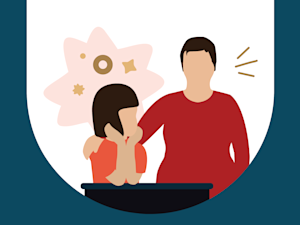
February 15, 2024
Talking with your child about their diagnosis of a learning and thinking difference can be tough. Get advice from an expert.
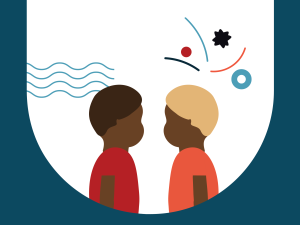
February 1, 2024
How can you manage the challenges of having one child who learns and thinks differently and one child who doesn’t? Get advice from an expert.
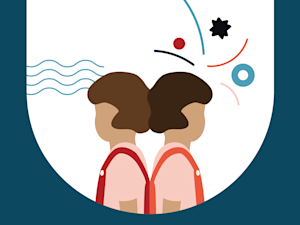
January 18, 2024
Any sibling relationship can be hard to manage. But what happens when one of the siblings has a learning or thinking difference? Here’s one mom’s story.

January 4, 2024
Overwhelmed by talking with your child’s pediatrician about ADHD or learning differences? These tips can help.
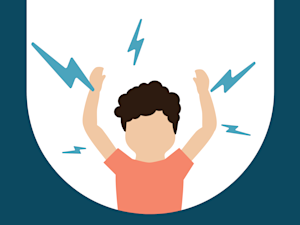
December 14, 2023
Tantrums and meltdowns are challenges all parents face. Get tips for projecting calm when kids and teens have tantrums.